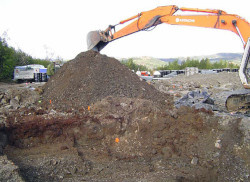Drum Excavation and Handling
Before initiating subsurface excavation, ground-penetrating systems should be used to confirm the location and depth of drums.
Soil should be removed with caution to minimize the potential of drum rupture. A dry chemical fire extinguisher should be available to control small fires during drum and container excavation and initial handling, workers may be exposed to many hazards.
The purpose of drum handling is to:
- respond to obvious problems that might impair worker safety;
- unstack and orient drums for sampling; and
- if necessary, organize drums into different areas on-site to facilitate characterization and remedial action.
Handling may or may not be necessary, depending on how the drums are positioned at a site. When handling is necessary, follow these best practices:
- Drums should only be handled when necessary to avoid accidents.
- Before handling, all personnel should be warned about the hazards of handling and instructed to minimize handling as much as possible.
- Before moving anything, determine the appropriate sequence for moving drums and other containers.
- If a drum containing a liquid cannot be moved without rupture, its contents should be immediately transferred to a sound drum.
- Leaking drums that contain sludges or semi-solids, open drums that contain liquid or solid waste, and deteriorated drums that can be moved without rupture should be placed in overpack containers (larger drums in which smaller leaking or damaged drums are placed for storage or shipment).
- In all phases of handling, personnel should be alert for new information about potential hazards and should respond to new hazards before continuing with routine handling operations.
- Train workers and equipment operators in proper lifting and moving techniques.
- Prepare overpacks before any attempt is made to move drums.
- Empty overpack drums and an adequate volume of absorbent should be kept near areas where minor spills may occur.
- Where major spills may occur, a containment berm should be constructed before handling.
- Supply workers and equipment operators with appropriate respiratory protective equipment.
- Ensure operators have a clear view of the roadway when carrying drums. Where necessary, have ground workers available to direct the operator's motion.
- If drum contents spill, personnel trained in spill response should isolate and contain the spill.
Knowledge Check Choose the best answer for the question.
3-4. Which action should be taken when handling leaking drums that contain sludges, open drums that contain waste, and deteriorated drums that can be moved without rupture?
You forgot to answer the question!

